
Santa Croce: Florence's Artistic and Cultural Heart
Santa Croce, nestled in the heart of Florence, Italy, is a treasure trove of history, art, and culture. This vibrant neighbourhood is home to the magnificent Basilica of Santa Croce, the largest Franciscan church in the world, where you can marvel at frescoes by Giotto and the tombs of iconic figures like Michelangelo, Galileo, and Machiavelli. The square in front of the basilica, Piazza Santa Croce, is a bustling hub of activity, often hosting local events, markets, and the famous Calcio Storico, a historic football match that dates back to the Renaissance. Wandering through the cobbled streets of Santa Croce, you will find a charming mix of artisan workshops, boutique stores, and inviting cafes. The neighbourhood is renowned for its leather goods, with many shops offering custom-made items that you can watch being crafted on-site. Art lovers will enjoy a visit to the Museo dell'Opera di Santa Croce, which houses a collection of religious art and artifacts from the basilica. Santa Croce is not just about history and shopping; it also boasts a lively nightlife scene. The area is dotted with wine bars and traditional trattorias where you can savour Tuscan cuisine and local wines. Be sure to explore the quieter backstreets, where you might stumble upon a hidden gem of a restaurant or a quaint bar with live music. Whether you're an art enthusiast, a history buff, or simply looking to soak up the authentic Florentine atmosphere, Santa Croce offers a rich and rewarding experience.
Local tips in Santa Croce
- Visit early in the morning or late afternoon to avoid the crowds at the Basilica of Santa Croce.
- Explore local leather shops for unique, handcrafted goods.
- Check the local calendar for events in Piazza Santa Croce, such as the Calcio Storico.
- Take a leisurely stroll through the backstreets to discover hidden cafes and boutique stores.
- Try traditional Tuscan dishes at a local trattoria for an authentic culinary experience.
Santa Croce: Florence's Artistic and Cultural Heart
Santa Croce, nestled in the heart of Florence, Italy, is a treasure trove of history, art, and culture. This vibrant neighbourhood is home to the magnificent Basilica of Santa Croce, the largest Franciscan church in the world, where you can marvel at frescoes by Giotto and the tombs of iconic figures like Michelangelo, Galileo, and Machiavelli. The square in front of the basilica, Piazza Santa Croce, is a bustling hub of activity, often hosting local events, markets, and the famous Calcio Storico, a historic football match that dates back to the Renaissance. Wandering through the cobbled streets of Santa Croce, you will find a charming mix of artisan workshops, boutique stores, and inviting cafes. The neighbourhood is renowned for its leather goods, with many shops offering custom-made items that you can watch being crafted on-site. Art lovers will enjoy a visit to the Museo dell'Opera di Santa Croce, which houses a collection of religious art and artifacts from the basilica. Santa Croce is not just about history and shopping; it also boasts a lively nightlife scene. The area is dotted with wine bars and traditional trattorias where you can savour Tuscan cuisine and local wines. Be sure to explore the quieter backstreets, where you might stumble upon a hidden gem of a restaurant or a quaint bar with live music. Whether you're an art enthusiast, a history buff, or simply looking to soak up the authentic Florentine atmosphere, Santa Croce offers a rich and rewarding experience.
Iconic landmarks you can’t miss
Basilica of Santa Croce in Florence
Explore the Basilica of Santa Croce in Florence, a stunning Gothic masterpiece and the resting place of Italian luminaries, rich in art and history.

Monument to Dante Alighieri
Discover the Monument to Dante Alighieri in Florence: A tribute to the literary genius set in a vibrant historical square, blending culture and beauty.
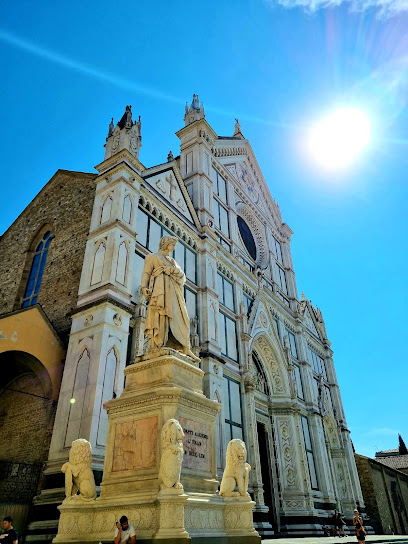
Michelangelo Buonarroti Tomb
Explore the legacy of Michelangelo at his breathtaking tomb in Florence's Basilica di Santa Croce, a historical landmark of unparalleled artistic significance.
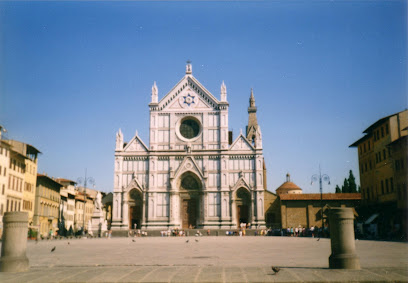
Convento di Santa Croce
Discover the serene beauty and rich history of Convento di Santa Croce, a cultural landmark in Florence that captures the essence of Italian artistry and spirituality.
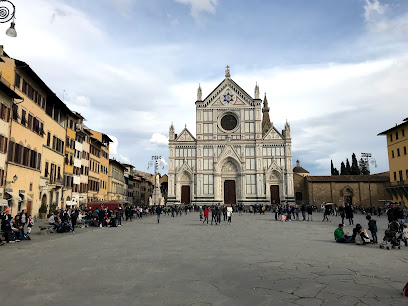
Porta alla Croce
Explore Porta alla Croce, an iconic historical landmark in Florence, showcasing the city's architectural beauty and rich cultural heritage.
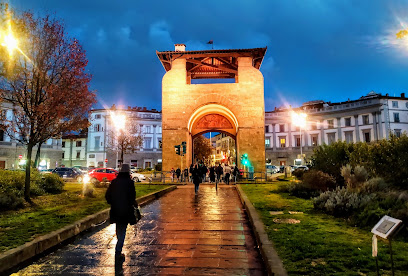
Palazzo dell'Antella
Explore the historical charm of Palazzo dell'Antella, a stunning landmark in Florence's vibrant Piazza di Santa Croce, steeped in rich cultural heritage.
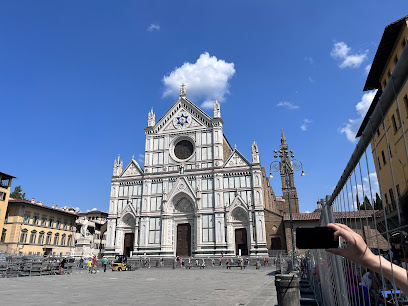
Tomb of Niccolo Machiavelli
Explore the Tomb of Niccolò Machiavelli in Florence, a historical landmark celebrating the father of modern political philosophy in a captivating setting.
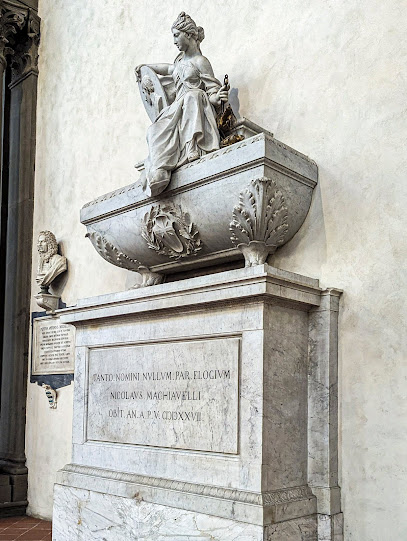
Tomb of Leonardo Bruni
Explore the Tomb of Leonardo Bruni in Florence, a historical landmark celebrating the legacy of Renaissance humanism in the heart of Italy's cultural capital.
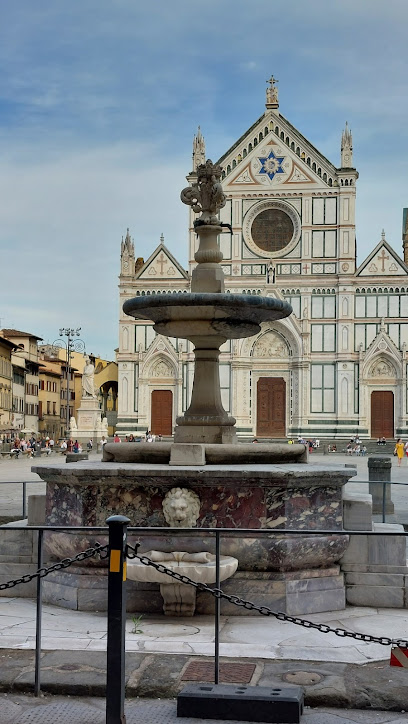
Piazza di Santa Croce
Explore the historic Piazza di Santa Croce, a vibrant town square in Florence, Italy, surrounded by rich culture, stunning architecture, and lively local life.
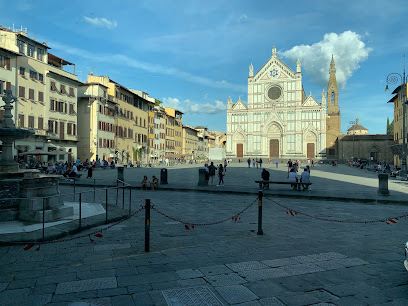
Santa Croce 14 - Palazzo Gargiolli
Discover the enchanting Palazzo Gargiolli, a heritage building in Florence that showcases the city’s splendid architecture and rich cultural history.
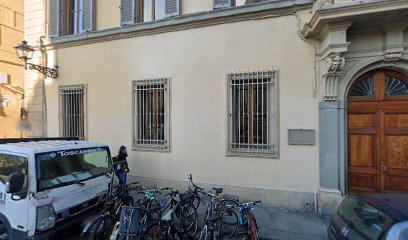
Unmissable attractions to see
Piazzale Michelangelo
Experience the breathtaking views of Florence at Piazzale Michelangelo, a must-visit plaza for every traveler seeking picturesque moments.
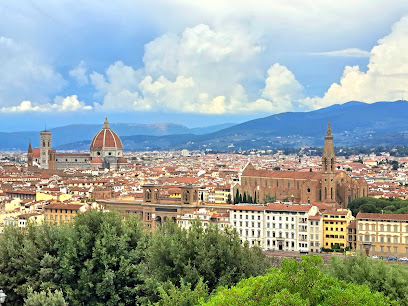
Uffizi Gallery
Explore the Uffizi Gallery in Florence, home to Italy's most exquisite collection of Renaissance art and architectural beauty.
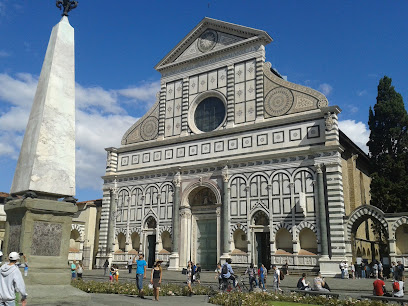
Brunelleschi's dome
Explore the breathtaking Brunelleschi's Dome in Florence, an architectural wonder that offers stunning views and rich historical significance.
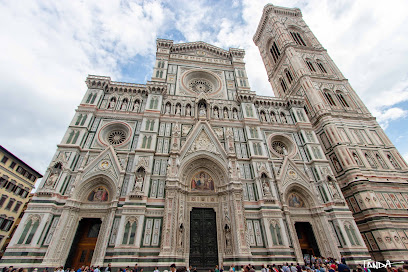
Monument to Dante Alighieri
Explore the Monument to Dante Alighieri in Florence, a stunning tribute to Italy's literary genius, surrounded by history and vibrant culture.
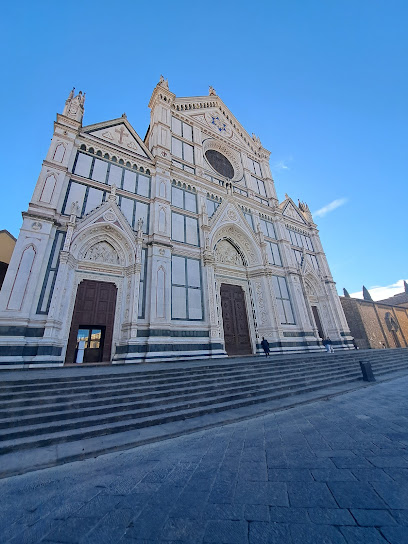
Essential places to dine
Da Que' Ganzi Trattoria Osteria
Discover authentic Tuscan cuisine at Da Que' Ganzi Trattoria Osteria in Florence, where tradition meets taste.
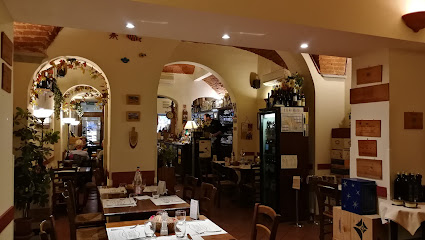
Finisterrae
Discover Finisterrae: A delightful blend of Italian and Mediterranean cuisine awaits you in Florence's charming Piazza di Santa Croce.
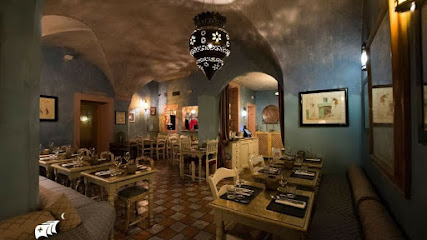
Osteria dei Pazzi
Experience authentic Italian flavors at Osteria dei Pazzi in Florence - where tradition meets culinary excellence.
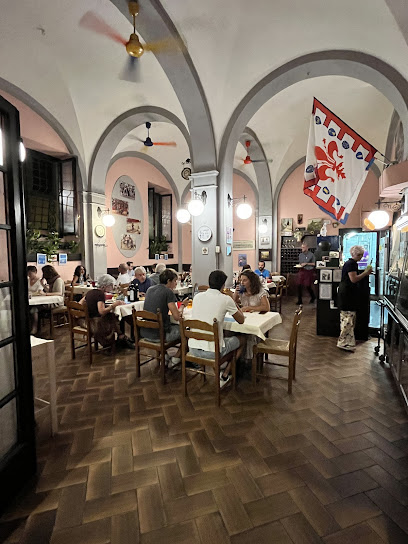
Lo Schiacciavino - Santa Croce
Discover authentic Italian sandwiches at Lo Schiacciavino in Florence - where fresh ingredients meet traditional flavors.
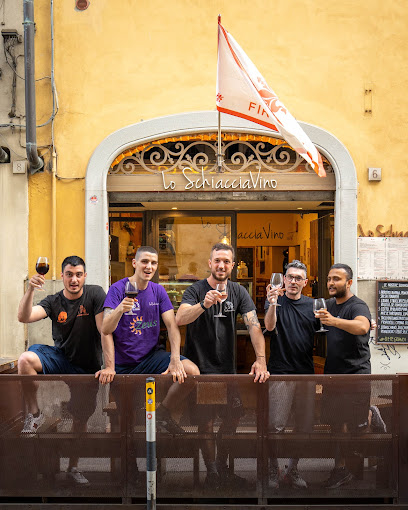
Bisteccheria Santa Croce
Discover authentic Tuscan flavors at Bisteccheria Santa Croce - a must-visit restaurant in Florence offering exquisite traditional dishes.
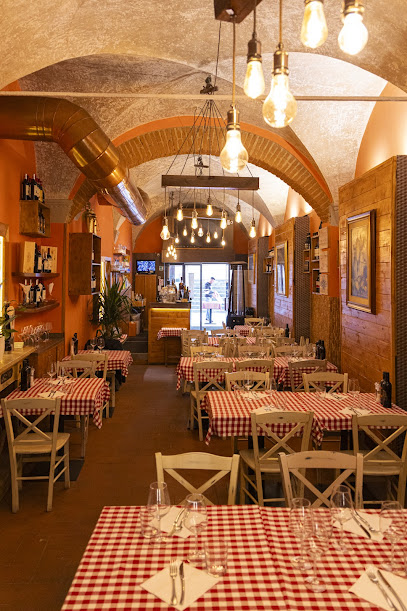
Ristorante Boccadama
Experience authentic Italian cuisine at Ristorante Boccadama in Florence - where tradition meets taste in a charming setting.
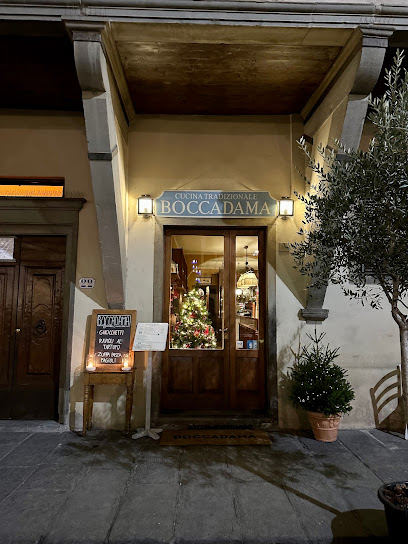
Baldovino Bistrot
Experience authentic Tuscan flavors at Baldovino Bistrot in Florence – where every dish tells a story.
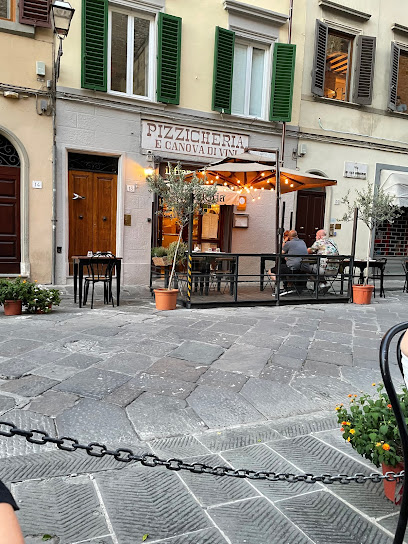
Il Francescano Tavern
Experience authentic Tuscan cuisine at Il Francescano Tavern in Florence - where every dish tells a story.
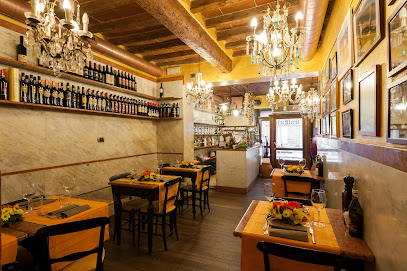
Trattoria Cantinetta Allegri
Experience authentic Tuscan cuisine at Trattoria Cantinetta Allegri in Florence - where tradition meets flavor in every bite.
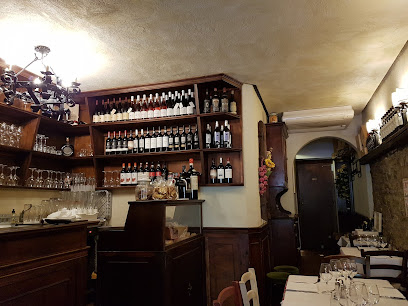
Ca' Pelletti Firenze
Savor authentic Italian flavors at Ca' Pelletti Firenze - where tradition meets culinary excellence in the heart of Florence.
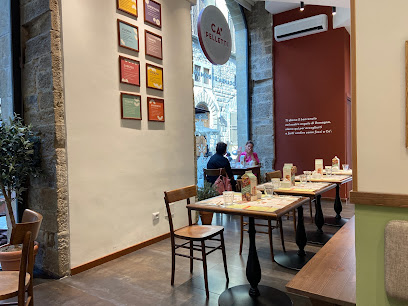
Markets, malls and hidden boutiques
The Gold Market
Explore the enchanting Gold Market in Florence, where exquisite craftsmanship meets rich tradition in the heart of Italy.
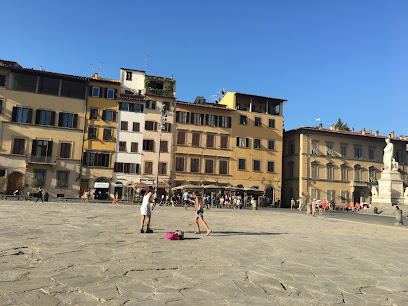
Cose Cosi Firenze
Discover unique treasures at Cose Cosi Firenze, where Italian craftsmanship meets unforgettable souvenirs in the heart of Florence.
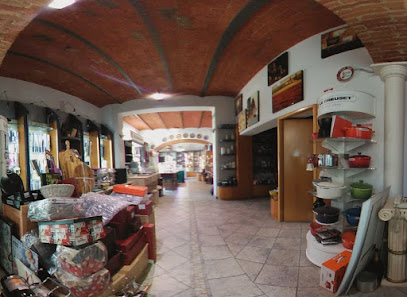
Misuri
Explore Misuri in Florence for exquisite leather goods that reflect the artistry and tradition of Italian craftsmanship.
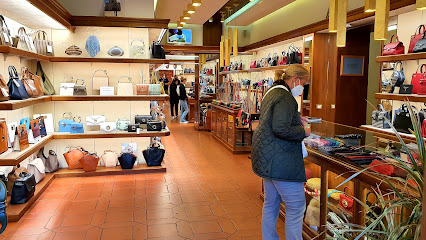
Italy Souvenir - Gift Shop
Explore Italy Souvenir in Florence - your go-to destination for authentic gifts and unique keepsakes reflecting the beauty and culture of the city.
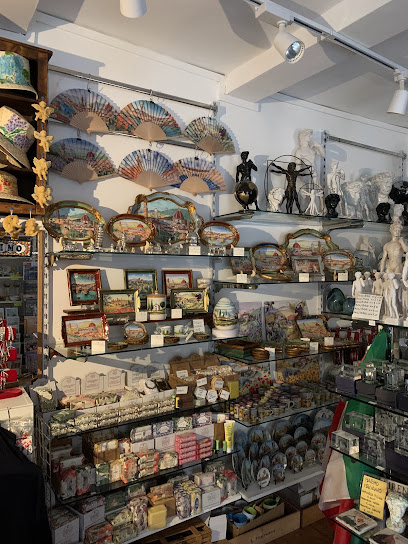
Balinesia
Explore Balinesia in Florence for exquisite jewelry and unique fashion pieces that celebrate Italian artistry and craftsmanship.
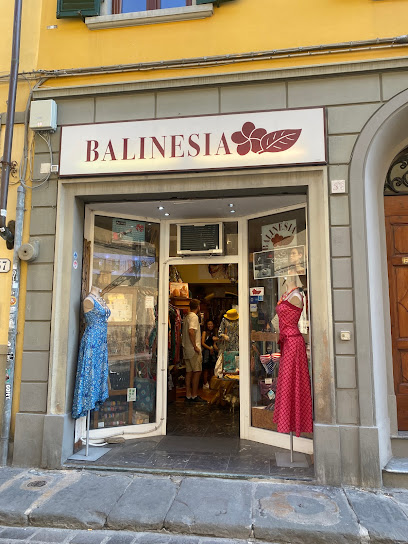
Souvenirs Di Cammelli L. E Marzi L. S.N.C.
Explore Souvenirs Di Cammelli in Florence for unique local crafts, delightful stationery, and refreshing beverages, capturing the essence of Italian culture.
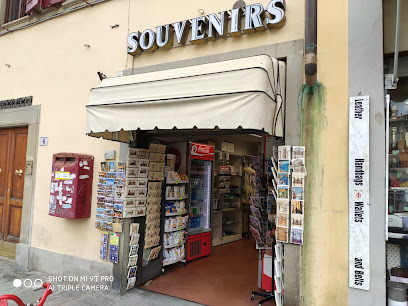
Florentia Pelle
Explore Florentia Pelle in Florence for exquisite leather goods showcasing timeless Italian craftsmanship and style.
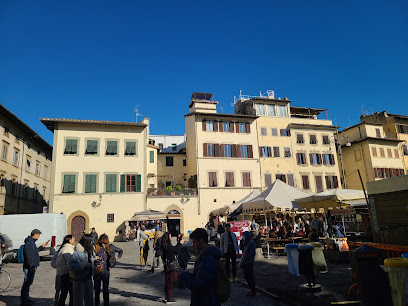
Googift's Florence
Explore Googift's Florence for unique souvenirs, local crafts, and cherished mementos to remember your unforgettable trip to this enchanting city.
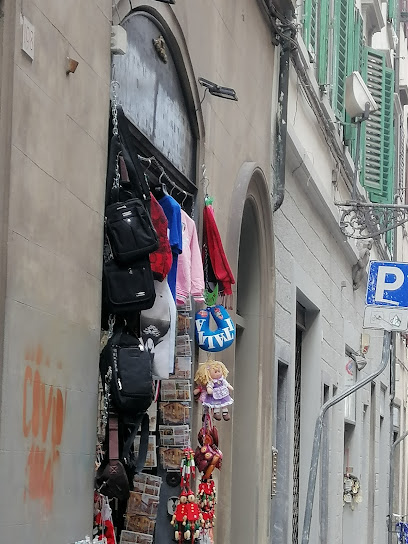
Francesca Tangocci Pittrice
Discover unique Florentine artistry at Francesca Tangocci Pittrice, a gift shop showcasing the vibrant spirit of Florence through handmade treasures.
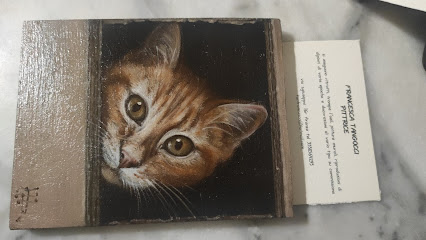
Canificio
Explore the enchanting world of antiques at Canificio, a hidden treasure in Florence, where history and craftsmanship come alive.
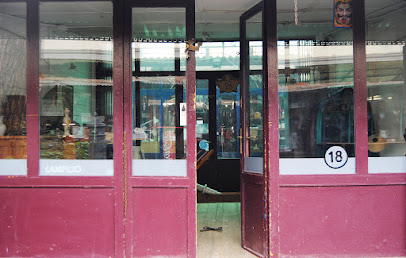
Essential bars & hidden hideouts
Virgin Rock Pub
Discover the lively atmosphere of Virgin Rock Pub in Florence, where music, drinks, and good vibes come together for a memorable night out.
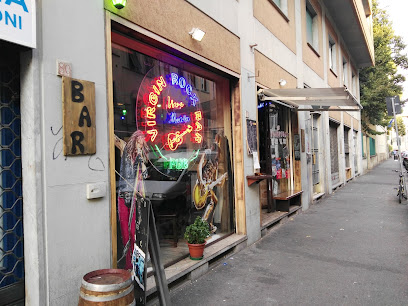
Quelo Bar
Discover the vibrant atmosphere of Quelo Bar, a charming spot in Florence that blends delicious drinks with authentic Italian hospitality.
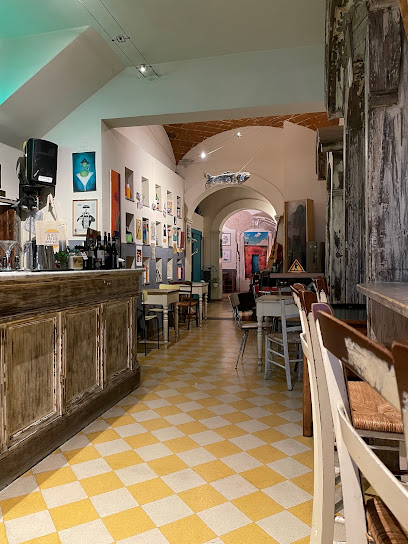
Bitter Bar
Experience the vibrant nightlife of Florence at Bitter Bar, known for its innovative cocktails and inviting ambiance.
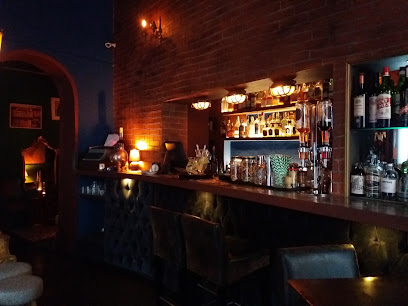
Kikuya Pub
Discover Kikuya Pub, a lively spot in Florence offering a mix of local and international drinks in a vibrant atmosphere filled with warmth and charm.
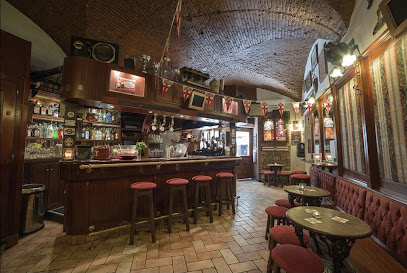
The Book Pub
Discover The Book Pub in Florence, a perfect blend of literature and leisure where every drink tells a story and every shelf invites exploration.
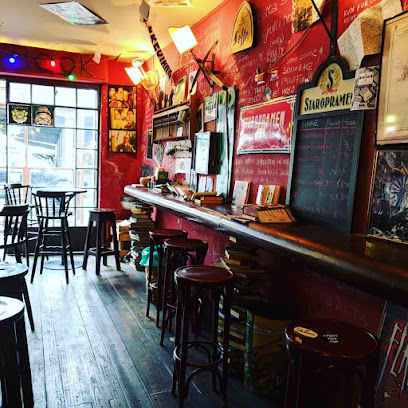
Piccolo Cafè
Discover the vibrant and inclusive atmosphere of Piccolo Cafè in Florence, a must-visit bar for cocktails and camaraderie.
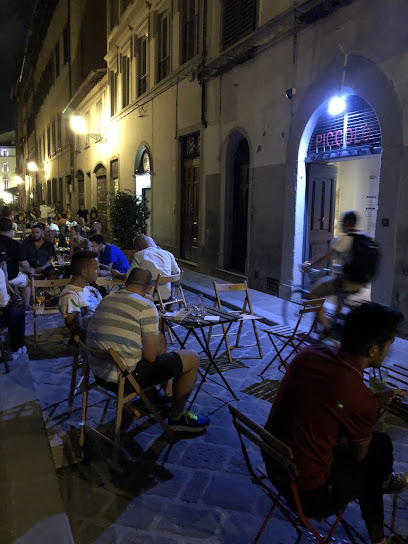
Nove7
Experience the vibrant atmosphere of Nove7, a unique bar in Florence offering delightful drinks and a lively ambiance.
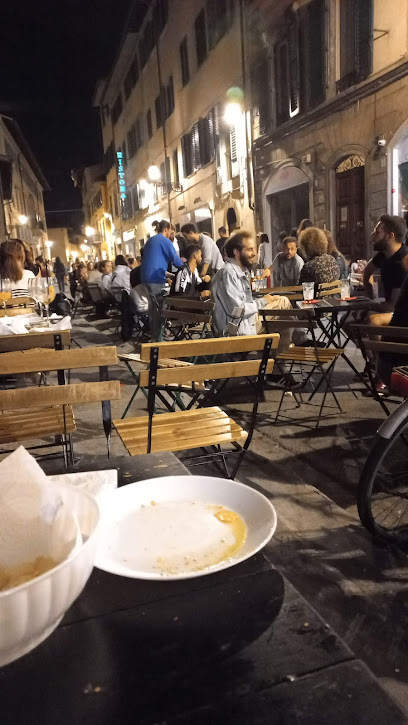
Grotta Divino
Experience the finest Tuscan wines and authentic Italian cuisine at Grotta Divino, a cozy wine bar in the heart of Florence.
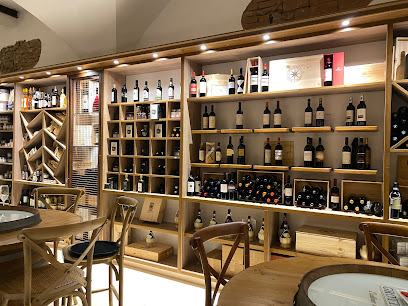
Green Street Bar
Experience the charm of Florence at Green Street Bar, your perfect spot for cocktails, wine, and a cozy café atmosphere.
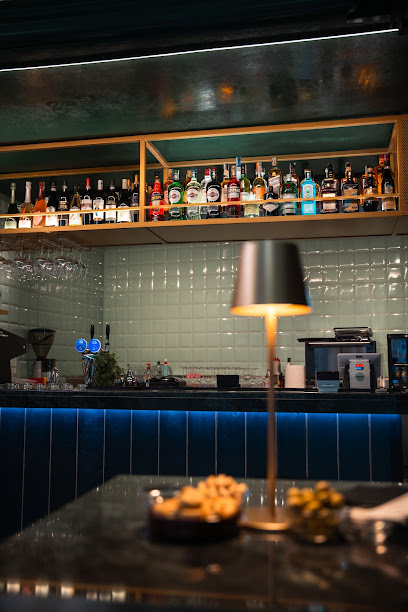
Vintage Wine Bar
Experience exquisite Italian wines and local delicacies at Vintage Wine Bar, a charming spot in the heart of Florence.
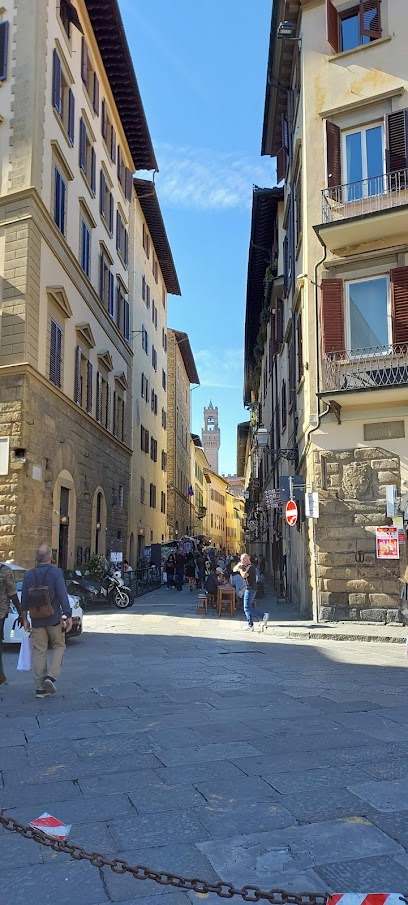
Local Phrases
-
- HelloCiao
[chow] - GoodbyeArrivederci
[ah-ree-veh-dehr-chee] - YesSì
[see] - NoNo
[noh] - Please/You're welcomePer favore/Prego
[pehr fah-vo-reh/preh-goh] - Thank youGrazie
[grah-tsyeh] - Excuse me/SorryMi scusi/Scusa
[mee skoo-zee/skoo-sah] - How are you?Come stai?
[koh-meh stah-ee] - Fine. And you?Bene. E tu?
[beh-neh. eh too] - Do you speak English?Parli inglese?
[pahr-lee een-gleh-zeh] - I don't understandNon capisco
[nohn kah-pee-scoh]
- HelloCiao
-
- I'd like to see the menu, pleaseVorrei vedere il menù, per favore
[vohr-eh-ee veh-deh-reh eel meh-noo, pehr fah-vo-reh] - I don't eat meatNon mangio carne
[nohn mahn-joh kahr-neh] - Cheers!Salute!
[sah-loo-teh] - I would like to pay, pleaseVorrei pagare, per favore
[vohr-eh-ee pah-gah-reh, pehr fah-vo-reh]
- I'd like to see the menu, pleaseVorrei vedere il menù, per favore
-
- Help!Aiuto!
[ah-yoo-toh] - Go away!Vai via!
[vah-ee vyah] - Call the Police!Chiama la Polizia!
[kyah-mah lah poh-lee-tsyah] - Call a doctor!Chiama un dottore!
[kyah-mah oon doht-toh-reh] - I'm lostMi sono perso
[mee soh-noh pehr-soh] - I'm illSto male
[stoh mah-leh]
- Help!Aiuto!
-
- I'd like to buy...Vorrei comprare...
[vohr-eh-ee kohm-prah-reh] - I'm just lookingSto solo guardando
[stoh soh-loh gwar-dahn-doh] - How much is it?Quanto costa?
[kwahn-toh koh-stah] - That's too expensiveÈ troppo caro
[eh trohp-poh kah-roh] - Can you lower the price?Puoi abbassare il prezzo?
[pwah-ee ahb-bah-sah-reh eel preh-tsoh]
- I'd like to buy...Vorrei comprare...
-
- What time is it?Che ora è?
[keh oh-rah eh] - It's one o'clockÈ l'una
[eh loo-nah] - Half past (10)Sono le dieci e mezza
[soh-noh leh dyeh-chee eh meh-tzah] - MorningMattina
[maht-tee-nah] - AfternoonPomeriggio
[poh-meh-ree-joh] - EveningSera
[seh-rah] - YesterdayIeri
[yeh-ree] - TodayOggi
[oh-jee] - TomorrowDomani
[doh-mah-nee] - 1Uno
[oo-noh] - 2Due
[dueh] - 3Tre
[treh] - 4Quattro
[kwah-troh] - 5Cinque
[cheen-kweh] - 6Sei
[seh-ee] - 7Sette
[seht-teh] - 8Otto
[oht-toh] - 9Nove
[noh-veh] - 10Dieci
[dyeh-chee]
- What time is it?Che ora è?
-
- Where's a/the...?Dov'è un/il...?
[doh-veh oon/eel] - What's the address?Qual è l'indirizzo?
[kwahl eh leen-dee-reet-soh] - Can you show me (on the map)?Puoi mostrarmi (sulla mappa)?
[pwah-ee mohs-trahr-mee (sool-lah mahp-pah)] - When's the next (bus)?Quando passa il prossimo (autobus)?
[kwahn-doh pahs-sah eel prohs-see-moh (ow-toh-boos)] - A ticket (to ....)Un biglietto (per ....)
[oon beel-lyet-toh (pehr)]
- Where's a/the...?Dov'è un/il...?
History of Santa Croce
-
The Basilica di Santa Croce, the most prominent landmark in the Santa Croce neighborhood, was founded in 1222 by the Order of the Franciscans. The church has since become a mausoleum for some of Italy's most illustrious figures, including Michelangelo, Galileo, and Machiavelli, solidifying its status as a cultural and historical cornerstone of Florence.
-
During the Renaissance, the Santa Croce neighborhood became a hub of artistic activity. The area surrounding the basilica attracted renowned artists and architects, such as Donatello and Brunelleschi, who contributed to the church’s art and architecture. The neighborhood was vibrant with workshops, studios, and galleries, fostering a culture of innovation and creativity that defined Florence during this period.
-
One of the most infamous events in Florentine history occurred in Santa Croce when the Pazzi family attempted to assassinate Lorenzo de' Medici during a church service. The failed conspiracy led to a brutal retaliation against the Pazzi family and their supporters, highlighting the intense political rivalries that characterized Florence in the late 15th century.
-
In the 19th century, the Basilica di Santa Croce underwent significant restoration efforts led by architect Giuseppe Poggi. This restoration aimed to preserve the church's historical integrity while enhancing its artistic features. The project included the restoration of frescoes and the installation of new chapels that reflect the Gothic style, contributing to the basilica's current grandeur.
-
The Santa Croce neighborhood played a role in the movement for Italian unification in the 19th century. The area became a gathering point for nationalist sentiments, with many intellectuals and revolutionaries frequenting the basilica and its surrounding spaces. This period saw the intertwining of cultural heritage and political aspirations, making Santa Croce a symbol of national pride.
-
Today, Santa Croce continues to be a vibrant cultural district known for its artisan workshops, traditional leather shops, and lively piazzas. The area hosts numerous cultural events, including the annual Calcio Storico, a historic football match that takes place in Piazza Santa Croce, celebrating the neighborhood's rich history and communal spirit.
Santa Croce Essentials
-
Santa Croce is centrally located in Florence, making it easily accessible from other neighborhoods. You can reach Santa Croce on foot from the Duomo (about a 15-minute walk) or Ponte Vecchio (around 10 minutes). For those using public transport, the nearest bus stops are located on Viale Giuseppe Mazzini and Via dei Benci, serviced by several local lines. Taxis are also available throughout the city and can drop you off at the main square.
-
Santa Croce is best explored on foot due to its narrow streets and pedestrian-friendly areas. Bicycles can be rented from various local shops, and there are bike lanes in some parts of the neighborhood. Public buses operate in the area, with stops near major attractions. However, the historical nature of Santa Croce means that many sites are within walking distance, making it easy to navigate without the need for extensive transport.
-
Santa Croce is generally safe for tourists. However, like in any popular area, be cautious of pickpockets, especially in crowded places like the piazzas and near major attractions. Avoid walking alone late at night in poorly lit alleys. Areas near the Santa Croce Church are usually lively, but be vigilant in quieter side streets.
-
In case of emergency, dial 112 for police, ambulance, or fire services. The nearest hospital, Ospedale di Santa Maria Nuova, is located just a short distance away. For minor medical issues, local pharmacies can provide assistance. It's advisable to have travel insurance covering emergencies.
-
Fashion: Do dress modestly when visiting churches; shorts and sleeveless tops may be inappropriate. Religion: Do respect religious customs; silence is expected in places of worship. Public Transport: Do be courteous and offer your seat to the elderly. Don't eat or drink on public transport. Greetings: Do greet with 'Buongiorno' (Good morning) or 'Buonasera' (Good evening). Eating & Drinking: Do enjoy local cuisine at trattorias. Don’t rush your meal; dining is a social experience in Italy.
-
To experience Santa Croce like a local, visit the artisan shops along Via de' Benci and enjoy a gelato from a local gelateria. Attend a local football match at Stadio Artemio Franchi for an authentic Florentine experience. Spend your evenings in the piazza, where locals gather to socialize. Try to visit during the off-peak hours to avoid crowds at major attractions.
-
When visiting religious sites, ensure your shoulders and knees are covered. It is also customary to greet shopkeepers and restaurant staff upon entering and leaving. In dining settings, it's polite to wait for everyone at the table to be served before starting to eat.
-
Santa Croce is home to many traditional trattorias and wine bars. Do try dishes like 'Ribollita' and 'Pici' pasta. When ordering wine, consider asking for local varieties like Chianti or Brunello. Tipping is appreciated but not obligatory; rounding up the bill or leaving small change is common.
Nearby Cities to Santa Croce
-
Things To Do in San Gimignano
-
Things To Do in Siena
-
Things To Do in Arezzo
-
Things To Do in Lucca
-
Things To Do in Pisa
-
Things To Do in Bologna
-
Things To Do in Montepulciano
-
Things To Do in Chiesanuova
-
Things To Do in Acquaviva
-
Things To Do in San Marino
-
Things To Do in Fiorentino
-
Things To Do in Borgo Maggiore
-
Things To Do in Domagnano
-
Things To Do in Montegiardino
-
Things To Do in Serravalle








